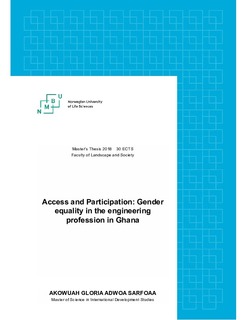| dc.contributor.advisor | Stuvøy, Kirsti | |
| dc.contributor.author | Akowuah, Gloria Adwoa Sarfoaa | |
| dc.coverage.spatial | Ghana, Accra | nb_NO |
| dc.date.accessioned | 2018-07-16T12:37:28Z | |
| dc.date.available | 2018-07-16T12:37:28Z | |
| dc.date.issued | 2018 | |
| dc.identifier.uri | http://hdl.handle.net/11250/2505690 | |
| dc.description.abstract | The engineering profession which is among one of the fields noted for advancing economic growth continues to illustrate a low number of females amid interventions. The profession, branded as “male dominated field” speaks volumes of inequality not only in the profession itself but has become a growing global concern of gender inequality in the labour market. This study is a qualitative research method based on gender equality in the Ghanaian labour market. It specifically examines what accounts for the low number of female engineers in the Ghanaian labour market. By using a semi-structured interview as a data collection tool, the study interviews sixteen female engineers in Ghana. It also uses a theoretical framework based on the Gender and Development (GAD) approach which takes a broader perspective on gender (in) equality, the disproportionate amount of work performed by women, and yet the under representation of women in the professions denoted as masculine. In its relevance to the study, the GAD, and three key concepts namely gender roles, gender equality, and the labour market are used to guide the analysis of the findings. The findings of the study show that the female reproductive role accounts for the low number of female engineers in the Ghanaian labour market. The female engineers in their response, emphasises the societal perception on the female reproductive role, and in its interpretation in the state’s policy as parental leave, creates an unshared responsibility regarding the role; bias due to the absence of the paternal leave in the state policies; and due to the limited three-month period allocated to the leave constraining their efforts to balance work and domestic duties. | nb_NO |
| dc.language.iso | eng | nb_NO |
| dc.publisher | Norwegian University of Life Sciences, Ås | nb_NO |
| dc.rights | Attribution-NonCommercial-NoDerivatives 4.0 Internasjonal | * |
| dc.rights.uri | http://creativecommons.org/licenses/by-nc-nd/4.0/deed.no | * |
| dc.subject | Gender roles | nb_NO |
| dc.subject | Labour market | nb_NO |
| dc.title | Access and participation : gender equality in the engineering profession in Ghana | nb_NO |
| dc.type | Master thesis | nb_NO |
| dc.source.pagenumber | 73 | nb_NO |
| dc.description.localcode | M-DS | nb_NO |

